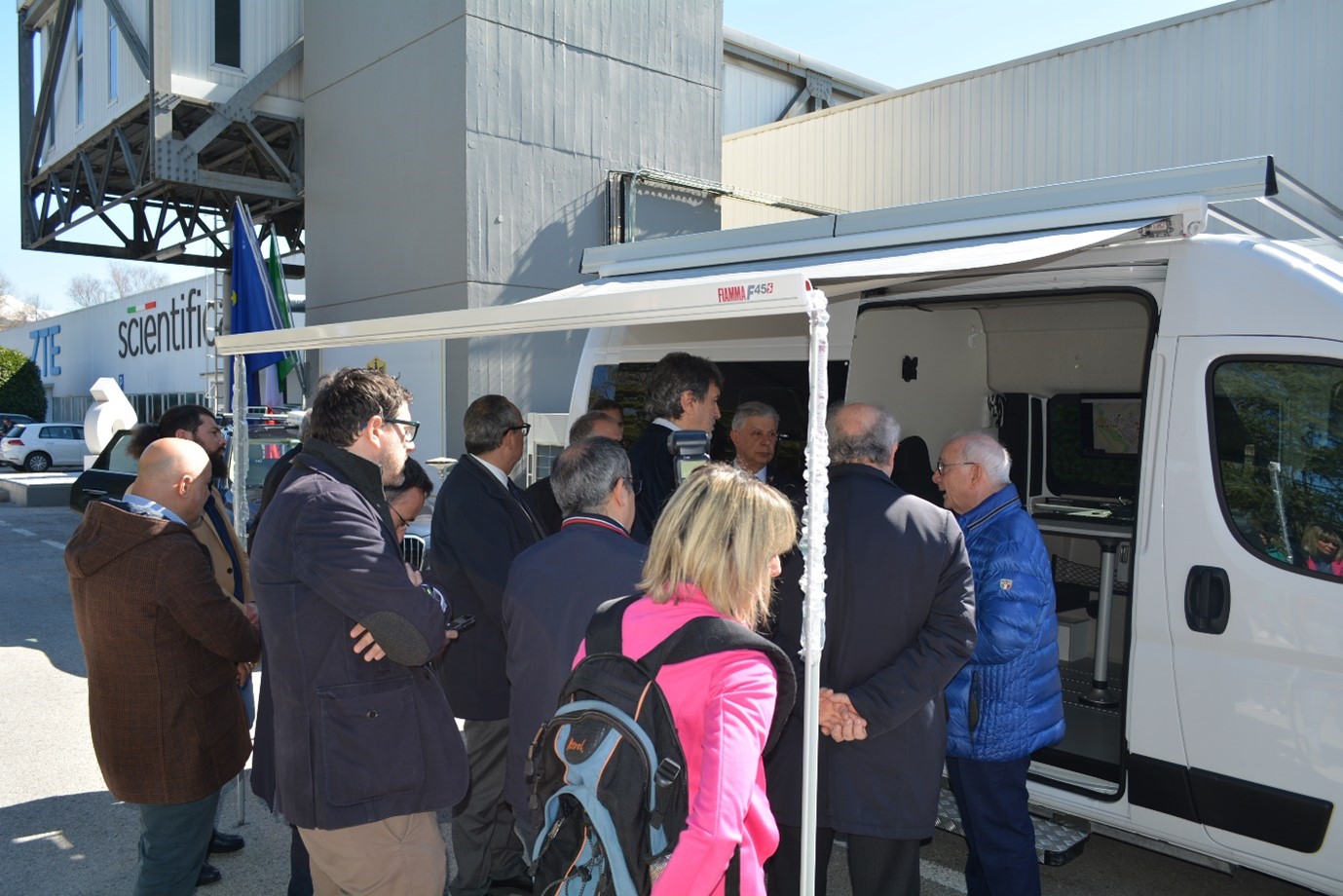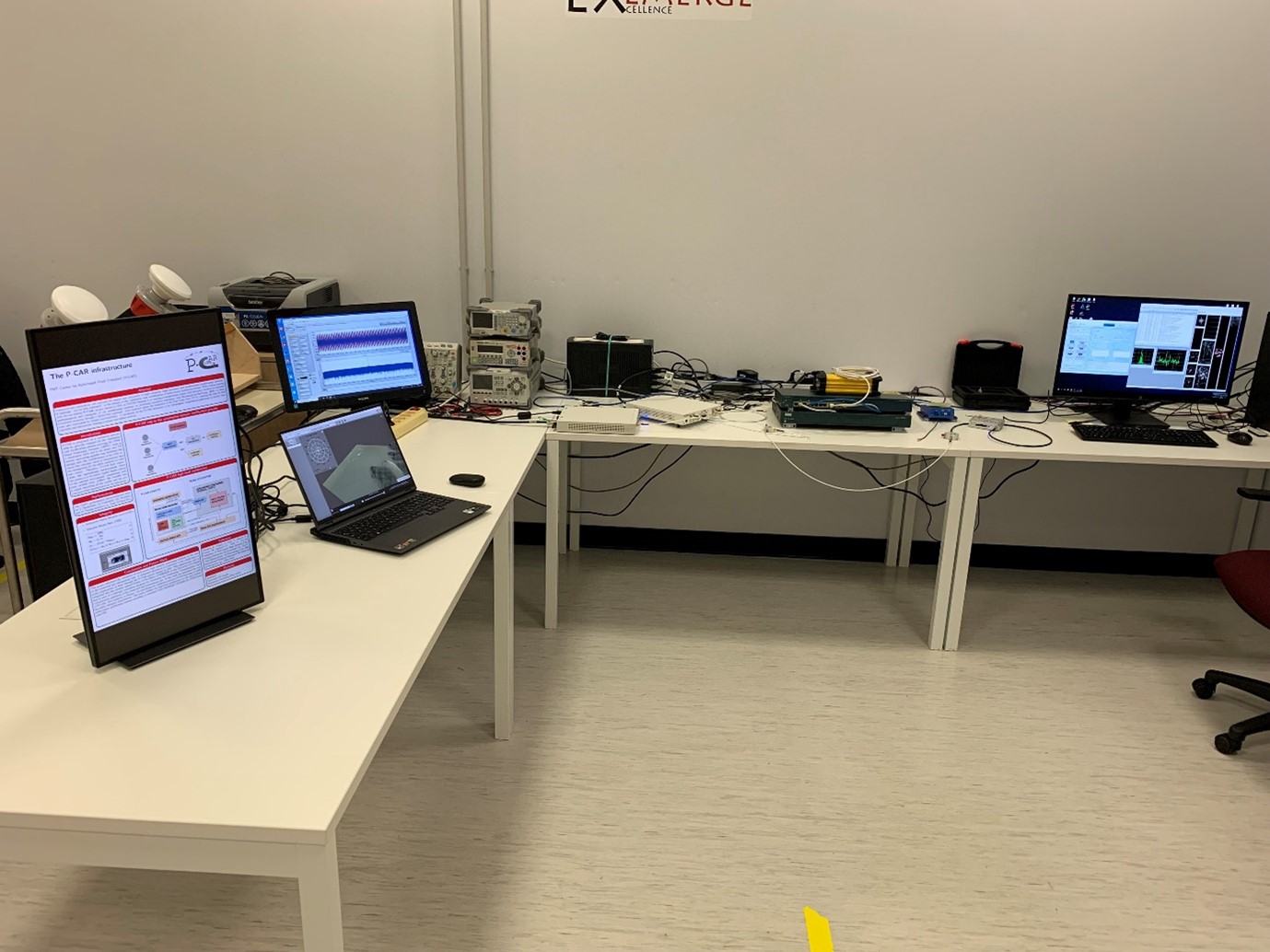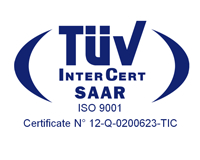 • First European ecosystem for innovation, research and specialist training for geo-location, telecommunications and cyber security technologies for autonomous vehicles;
• First European ecosystem for innovation, research and specialist training for geo-location, telecommunications and cyber security technologies for autonomous vehicles;
• Technological synergies between the aerospace and automotive domains of the Abruzzo Region;
• International Centre for the validation and certification support of new technologies in collaboration with ASI and ESA;
• Research and industrial system in Abruzzo with Radiolabs (leader), Leonardo, Telespazio, Elital, University of L’Aquila, Polo Innovazione Automotive.
The first European ecosystem for new satellite and telecommunications technologies of connected and autonomous driving cars was previewed to the President of the Region Marco Marsilio and to the Rector of the University of L’Aquila Edoardo Alesse. The heart of this system is in L’Aquila in the Abruzzo Technopole which hosts the Radiolabs Laboratory – leader in satellite technologies for intelligent transport – and the Centre of Excellence for research and higher education in this new sector. The Abruzzo ecosystem – resulting from the EMERGE project in collaboration with FCA-Stellantis and funded by the then MISE as part of the Innovation Agreement with an investment of over € 5M in the Region – has been a catalyst for further national and international projects that have made it possible to enhance the technological synergies of the aerospace-automotive domains, which find in the Abruzzo Region a very fertile ground with the Ducato vehicle factory, the GALILEO Control Centre, and the Automotive Innovation Centre.
President Marsilio’s visit was an opportunity to show the first satellite applications for future mobility that is becoming increasingly connected and autonomous and at the same time safer, eco-sustainable and usable by all. In particular, the safe geo-location of vehicles (i.e. with guaranteed performance) which, thanks to GALILEO and the new signal processing techniques being developed, allows to reach levels of accuracy below one meter and therefore ideal for complementing current radar and video sensors are being tested worldwide for autonomous driving. An equally important role is delegated to satellite telecommunications technologies, in anticipation of the massive deployment of the new low-orbit constellations, to complement the terrestrial networks along the roads with the advantage of widespread coverage at lower costs and CO2 emissions.
EMERGE has made it possible to develop new applications for future connected driving such as the electronic horizon which, through updated digital maps, allows the driver to see beyond the visual horizon for dynamic and safer traffic management.

An important piece of the establishment in the Abruzzo Technopole is the EMERGE Center of Excellence launched with the support of CIPE and harmonized with fundings made available by MiSE and the Abruzzo Region for the EMERGE project. This Centre promotes research and development activities and the formation of specific skills in this area, through partnerships between universities, research institutions and industry, access to further funding on the research and transfer of technology at local and international level, with direct and indirect economic and employment effects on the territory.
During the visit, the new Mobile Laboratory was also presented, a Ducato vehicle equipped to perform field tests and equipped with high-accuracy geolocation terminals and terrestrial and satellite telecommunications and intelligent routing systems to select the most suitable telecommunications channel based on the available coverage.
 Thanks to EMERGE and the Center of Excellence, the University of L’Aquila and Radiolabs have trained a specialized and competitive team capable to win further projects such as SHINE-ON (Cybersecurity), HD-MOTION (European Digital Innovation Hub which received the Seal of Excellence) and P-CAR funded by ASI through ESA. The goal of P-CAR is to create an “independent” laboratory for the validation and certification of new devices for connected mobility and to support the design of autonomous vehicles. In fact, with the transition from manual to autonomous driving, safety is progressively improved, but it requires a much stricter preventive validation phase than what is currently required for manually driven cars since autonomous driving systems depend on the performance of the equipment to determine the position of the vehicle and the communications.
Thanks to EMERGE and the Center of Excellence, the University of L’Aquila and Radiolabs have trained a specialized and competitive team capable to win further projects such as SHINE-ON (Cybersecurity), HD-MOTION (European Digital Innovation Hub which received the Seal of Excellence) and P-CAR funded by ASI through ESA. The goal of P-CAR is to create an “independent” laboratory for the validation and certification of new devices for connected mobility and to support the design of autonomous vehicles. In fact, with the transition from manual to autonomous driving, safety is progressively improved, but it requires a much stricter preventive validation phase than what is currently required for manually driven cars since autonomous driving systems depend on the performance of the equipment to determine the position of the vehicle and the communications.

P-CAR’s digital infrastructure – the first in Europe – allows to simulate, emulate and test geo-location and telecommunications devices and their robustness to possible cyber-attacks under the operational scenarios of the connected and autonomous car in the most extreme operating situations. A sort of stress-test for critical equipments for the security and safety in a predominantly virtualized environment, which creates the most extreme risk conditions and with less probability of occurrence impacting the safety that are difficult to detect with field measurements alone. P-CAR relays on a secure cloud platform to allow all equipment and vehicle suppliers, wherever they are, to make use of the services of the Laboratory at l’Aquila and specialist advice to independently evaluate the performance of their equipment and to support the certification and approval phases before placing it on the market.
After the visit to the Technopole, the delegation moved to the offices of the Region to deepen the subsequent phases and it was agreed to create a Table among the various subjects that made possible the realization of this Abruzzo ecosystem, including space agencies. The aim is to strengthen the current technological infrastructures and specialist skills also in consideration of the possible returns in other sectors such as the ERTMS train control systems on which Italy with RFI (FSI group) is leading in Europe tests with satellite technologies in view of possible operational use. A priority agreed during the meeting was also the involvement of users by leveraging further national and international collaborations in line with the development priorities identified by the Smart Specialisation Strategy (S3) of the Abruzzo Region, the tool that since 2014 the Regions and Member States of the European Union must adopt to identify objectives, priorities and actions capable of maximizing the effects of investments in research and innovation, aiming to concentrate resources on the areas of specialization characteristic of each territory.




